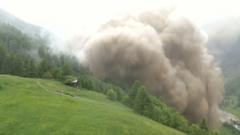Research from the University of Innsbruck highlights that even if global temperatures stabilize, a substantial portion of glacial mass will be lost over time. However, limiting temperature increases could significantly mitigate these losses.
Irreversible Glacier Loss: Research Reveals Long-term Melting Trends

Irreversible Glacier Loss: Research Reveals Long-term Melting Trends
A new study indicates glaciers will continue to melt for centuries, regardless of immediate climate change efforts.
Glacial ice is facing a troubling fate, according to new research published recently. The study reveals that the world's glaciers are set to diminish substantially over the next several centuries, regardless of the efficacy of climate mitigation efforts now in place. Even in a hypothetical scenario where global temperatures remain constant for the next millennium—which is virtually impossible—glaciers located outside of major ice sheets could lose about one-third of their total mass.
This grim outlook does not mean all is lost; the researchers stress that there is still an opportunity to lessen the impact of climate change. If global warming could be limited to 1.5 degrees Celsius, or 2.7 degrees Fahrenheit, above preindustrial levels, it is estimated that approximately twice as much glacial ice could be preserved compared to outcomes projected if temperatures rise to 2.7 degrees Celsius, which is the current trajectory for 2100. "Every tenth of a degree less of warming will help preserve glacial ice," said Lilian Schuster, a glacial modeler involved in the research published in the journal Science, emphasizing the importance of ambitious climate actions to protect our glaciers.
While the enormous ice sheets in Antarctica and Greenland receive considerable attention for their potential effects on global sea levels—projected to rise over 200 feet if fully melted—mountain glaciers also play a key role in the narrative of climate change. These glaciers constitute a tiny fraction of the world's ice (less than 0.5 percent), but their melting is expected to contribute roughly a foot to global sea level rise. Thus, the fate of these glaciers remains a crucial aspect of the ongoing discussions surrounding climate change and its long-term implications.





















